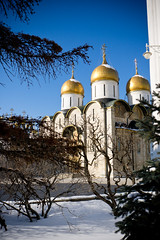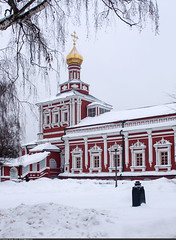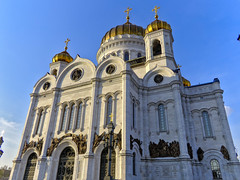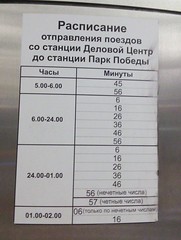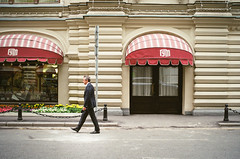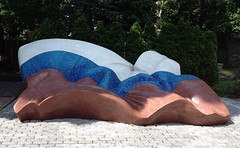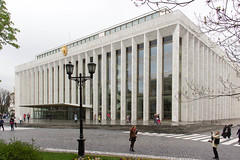Moscow
Moscow (English: /ˈmɒsk/ , US chiefly English: /ˈmɒsk/ ; Russian: Москва) is the capital and largest city of Russia. The city stands on the Moskva River in Central Russia, with a population estimated at 13.0 million residents within the city limits, over 17 million residents in the urban area, and over 21.5 million residents in the metropolitan area. The city covers an area of , while the urban area covers , and the metropolitan area covers over . Moscow is among the world's largest cities; being the most populous city entirely in Europe, the largest urban and metropolitan area in Europe, and the largest city by land area on the European continent.
First documented in 1147, Moscow grew to become a prosperous and powerful city that served as the capital of the Grand Duchy of Moscow. When the Tsardom of Russia was proclaimed, Moscow remained the political and economic center for most of its history. Under the reign of Peter the Great, the Russian capital was moved to the newly founded city of Saint Petersburg in 1712, diminishing Moscow's influence. Following the Russian Revolution and the establishment of the Russian SFSR, the capital was moved back to Moscow in 1918, where it later became the political center of the Soviet Union. In the aftermath of the dissolution of the Soviet Union, Moscow remained the capital city of the newly established Russian Federation.
The northernmost and coldest megacity in the world, Moscow is governed as a federal city, where it serves as the political, economic, cultural, and scientific center of Russia and Eastern Europe. As an alpha world city, Moscow has one of the world's largest urban economies. The city is one of the fastest-growing tourist destinations in the world, and is one of Europe's most visited cities. Moscow is home to the seventh-highest number of billionaires of any city in the world. The Moscow International Business Center is one of the largest financial centers in Europe and the world, and features the majority of Europe's tallest skyscrapers. Moscow was the host city of the 1980 Summer Olympics, and one of the host cities of the 2018 FIFA World Cup.
As the historic core of Russia, Moscow serves as the home of numerous Russian artists, scientists, and sports figures due to the presence of its various museums, academic and political institutions, and theaters. The city is home to several UNESCO World Heritage Sites and is well known for its display of Russian architecture, particularly its historic Red Square, and buildings such as the Saint Basil's Cathedral and the Moscow Kremlin, of which the latter serves as the seat of power of the Government of Russia. Moscow is home to many Russian companies in numerous industries and is served by a comprehensive transit network, which includes four international airports ten railway terminals, a tram system, a monorail system, and most notably the Moscow Metro, the busiest metro system in Europe, and one of the largest rapid transit systems in the world. The city has over 40 percent of its territory covered by greenery, making it one of the greenest cities in Europe and the world.
Etymology
The name of the city is thought to be derived from the name of the Moskva River. Several theories of the origin of the name of the river have been proposed. Finno-Ugric Merya and Muroma people, who were among the several pre-Slavic tribes which originally inhabited the area, called the river supposedly Mustajoki, in English: Black river. It has been suggested that the name of the city derives from this term.
The most linguistically well-grounded and widely accepted is from the Proto-Balto-Slavic root *mŭzg-/muzg- from the Proto-Indo-European *- "wet", so the name Moskva might signify a river at a wetland or a marsh. Its cognates include Russian: музга, "pool, puddle", Lithuanian: mazgoti and Latvian: mazgāt "to wash", Sanskrit: májjati "to drown", Latin: mergō "to dip, immerse". In many Slavic countries Moskov is a surname, most common in Russia, Bulgaria, Ukraine and North Macedonia. Additionally, there are similarly named places in Poland like Mozgawa.
The original Old Russian form of the name is reconstructed as *, *, hence it was one of a few Slavic . As with other nouns of that declension, it had been undergoing a morphological transformation at the early stage of the development of the language, as a result, the first written mentions in the 12th century were , (accusative case), , (locative case), , (genitive case). From the latter forms came to the modern Russian name , , which is a result of morphological generalization with the numerous Slavic .
However, the form Moskovĭ has left some traces in many other languages, including English: Moscow, German: Moskau, French: Moscou, Georgian: მოსკოვი, Latvian: Maskava, Bashkir: Мәскәү, , Portuguese: Moscovo, Chuvash: Мускав, and Spanish: Moscú.
In a similar manner the Latin name has been formed, later it became a colloquial name for Russia used in Western Europe in the 16th–17th centuries. From it as well came English Muscovy and muscovite.
Various other theories (of Celtic, Iranian, Caucasic origins), having little or no scientific ground, are now largely rejected by contemporary linguists.
Other names
Moscow has acquired several epithets, most referring to its size and preeminent status within the nation: The Third Rome , the Whitestone One , the First Throne , the Forty Soroks ("sorok" meaning both "forty, a great many" and "a district or parish" in Old Russian). Moscow is also one of the twelve Hero Cities. The demonym for a Moscow resident is "" (moskvich) for male or "ка" (moskvichka) for female, rendered in English as Muscovite. The name "Moscow" is abbreviated "MSK" (in Russian).
History
Prehistory
Archaeological digs show that the site of today's Moscow and the surrounding area have been inhabited since time immemorial. Among the earliest finds are relics of the Lyalovo culture, which experts assign to the Neolithic period, the last phase of the Stone Age.
They confirm that the first inhabitants of the area were hunters and gatherers. Around 950 AD, two Slavic tribes, Vyatichi and Krivichi, settled here. Possibly the Vyatichi formed the core of Moscow's indigenous population.
Early history (1147–1284)
The first known reference to Moscow dates from 1147 as a meeting place of Yuri Dolgoruky and Sviatoslav Olgovich. At the time it was a minor town on the western border of Vladimir-Suzdal Principality. The chronicle says, "Come, my brother, to Moskov" .
In 1156, Knyaz Yuri Dolgorukiy fortified the town with a timber fence and a moat. In the course of the Mongol invasion of Kievan Rus', the Mongols under Batu Khan burned the city to the ground and killed its inhabitants.
The timber fort na Moskvě "on the Moscow River" was inherited by Daniel, the youngest son of Alexander Nevsky, in the 1260s, at the time considered the least valuable of his father's possessions. Daniel was still a child at the time, and the big fort was governed by (deputies), appointed by Daniel's paternal uncle, Yaroslav of Tver.
Daniel came of age in the 1270s and became involved in the power struggles of the principality with lasting success, siding with his brother Dmitry in his bid for the rule of Novgorod. From 1283 he acted as the ruler of an independent principality alongside Dmitry, who became Grand Duke of Vladimir. Daniel has been credited with founding the first Moscow monasteries, dedicated to the Lord's Epiphany and to Saint Daniel.
Grand Duchy (1283–1547)
| The Moscow Kremlin in the late 16th century | The 1382 siege of Moscow | Red Square |
Daniel ruled Moscow as Grand Duke until 1303 and established it as a prosperous city that would eclipse its parent principality of Vladimir by the 1320s.
On the right bank of the Moskva River, at a distance of from the Kremlin, not later than in 1282, Daniel founded the first monastery with the wooden church of St. Daniel-Stylite, which is now the Danilov Monastery. Daniel died in 1303, at the age of 42. Before his death, he became a monk and, according to his will, was buried in the cemetery of the St. Daniel Monastery.
Moscow was quite stable and prosperous for many years and attracted a large number of refugees from across Russia. The Rurikids maintained large landholdings by practicing primogeniture, whereby all land was passed to the eldest sons, rather than dividing it up among all sons. By 1304, Yury of Moscow contested with Mikhail of Tver for the throne of the principality of Vladimir. Ivan I eventually defeated Tver to become the sole collector of taxes for the Mongol rulers, making Moscow the capital of Vladimir-Suzdal. By paying high tribute, Ivan won an important concession from the Khan.
While the Khan of the Golden Horde initially attempted to limit Moscow's influence, when the growth of the Grand Duchy of Lithuania began to threaten all of Russia, the Khan strengthened Moscow to counterbalance Lithuania, allowing it to become one of the most powerful cities in Russia. In 1380, prince Dmitry Donskoy of Moscow led a united Russian army to an important victory over the Mongols in the Battle of Kulikovo. Afterward, Moscow took the leading role in liberating Russia from Mongol domination. In 1480, Ivan III had finally broken the Russians free from Tatar control, and Moscow became the capital of an empire that would eventually encompass all of Russia and Siberia, and parts of many other lands.
In 1462 Ivan III, (1440–1505) became Grand Prince of Moscow (then part of the medieval Muscovy state). He began fighting the Tatars, enlarged the territory of Muscovy, and enriched his capital city. By 1500 it had a population of 100,000 and was one of the largest cities in the world. He conquered the far larger principality of Novgorod to the north, which had been allied to the hostile Lithuanians. Thus he enlarged the territory sevenfold, from . He took control of the ancient "Novgorod Chronicle" and made it a propaganda vehicle for his regime.
The original …
Looking for places related to Moscow?
Those are other destinations to find places related to Moscow:

